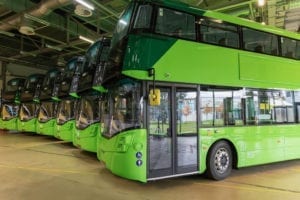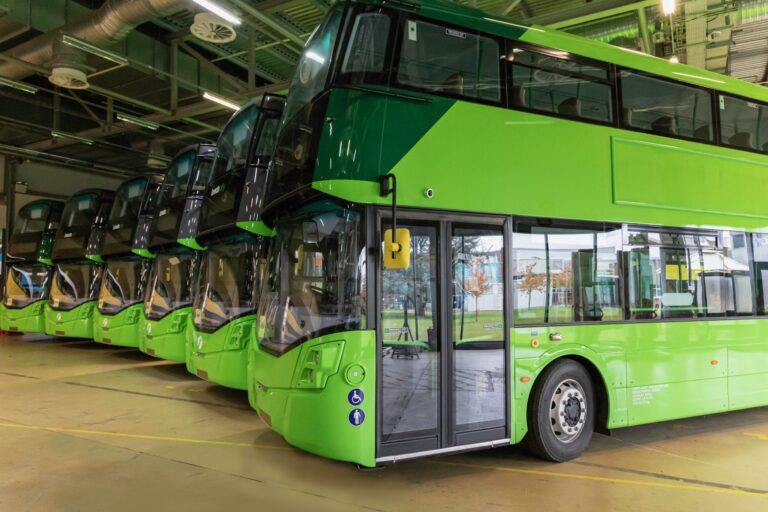Jo Bamford, grandson of JCB founder Joseph Bamford, has announced plans to deliver 3,000 UK-built hydrogen-powered buses to towns and cities across the country by 2024.
Bamford, who leads hydrogen production company Ryse, and owns bus manufacturer Wrightbus, claimed his plans are “an ideal option for a government that needs to boost UK manufacturing at this critical time whilst radically reducing our carbon emissions and air pollution”.
Bamford also revealed that he has already submitted his vision in a document to ministers.
Plans are being drawn up to introduce a total of 3,000 hydrogen buses – about 10% of the UK’s total fleet – in places such as Aberdeen, London, Birmingham, Liverpool, Manchester, Brighton, Glasgow, Edinburgh and Belfast.
Bamford said he believes that an “urgent introduction” of hydrogen buses will lead to a knock-on transformation of other heavy duty vehicles, such as lorries, trains, ships and even ambulances and police cars.
He claimed this would have the potential to “create and sustain hundreds of thousands of skilled, green collar jobs across the country”.
Greenhouse gases released from transportation reportedly account for a third of the UK’s total carbon emissions.

Whilst battery-powered cars are becoming increasingly popular, the technology’s current lack of range and considerable weight means it is not a viable option for heavy-duty forms of transport.
There are also growing concerns about the mining practices used to find the materials for batteries, as well as what happens to them at the end of their life, with recycling rates said to be lower than 5% in Europe and the USA.
However, Bamford claimed that “the hydrogen used to power these [buses] will be completely green”.
These vehicles will release only water vapour and save an estimated 280,000 tonnes of carbon dioxide each year, the equivalent of taking roughly 107,000 cars off the road a year.
Bamford’s company Ryse is in the process of building the UK’s first hydrogen production plant on the Kent coast.
This will be powered by a nearby offshore wind farm and use electrolysis to produce hydrogen from water.
Bamford said he plans to build another four hydrogen production plants by 2025 to provide enough power for all 3,000 buses.
“Cities around the world are seeing massive reductions in air pollution as many vehicles have been kept off the road during the pandemic,” said Bamford.

“However, the reality is that if we just go back to how public transport has traditionally been run, levels of pollution will quickly rise again to the same levels as before the crisis.
“We have an opportunity with hydrogen powered transport to make a huge difference to air quality, and for UK jobs as well.
“With increased orders on this scale I could increase the workforce at Wrightbus by nearly 700%.”
The UK government recently committed a £5bn plan to boost local bus services, of which a significant amount of this is likely to be spent on replacing diesel vehicles for zero-emission models.
UK-made hydrogen buses are already operating in London, and 20 of Wrightbus’ double deckers will be added to this later this year.
Last month, Aberdeen City Council placed an order for 15 of the hydrogen double deckers. The vehicles are expected to enter service in the Scottish city this summer.
Bamford has also asked the government to set aside £500m – 10% of the National Bus Strategy fund – to further the UK’s hydrogen industry.
Roughly £200m of this is said to be needed to build the hydrogen production facilities and bespoke, zero-emission transportation vehicles to take it to bus depots in city centres.
Another £300m is called for to subsidise the building of the buses to enable operators to purchase them for the same price as a current diesel one.
Want to read more stories like this?
Oxford takes delivery of first electric open-top double decker bus
London’s third electric double-deck bus route launches
Applications open for Britain’s first all-electric bus town
First Glasgow rolls out new electric city buses
 Want to learn more about issues, concepts and technologies that are changing the way in which people and goods move around urban environments safely, cleanly and efficiently? CiTTi Exhibition 2020 takes place on the 3rd and 4th of November at Coventry’s Ricoh Arena. Register your interest to attend at www.cittiexhibition.co.uk.
Want to learn more about issues, concepts and technologies that are changing the way in which people and goods move around urban environments safely, cleanly and efficiently? CiTTi Exhibition 2020 takes place on the 3rd and 4th of November at Coventry’s Ricoh Arena. Register your interest to attend at www.cittiexhibition.co.uk.





